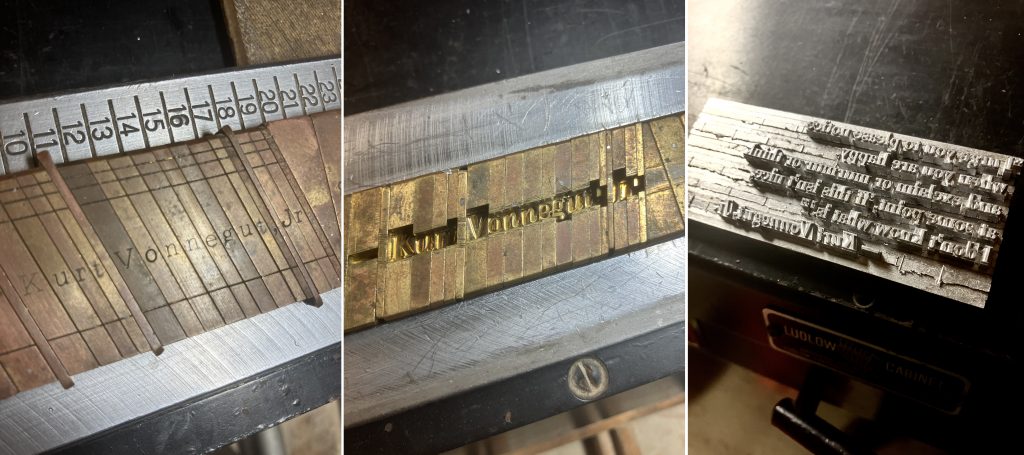
Midwest Ephemera can cast custom slugs of metal type on our Ludlow Typograph in a variety of fonts and sizes. It’s an affordable way for letterpress printers to simplify typesetting.
Why order Ludlow slugs rather than hand-composing type?
- You’re setting a job ten-up, and don’t want to typeset everything ten times.
- You need a few headlines, but don’t have enough characters to set them all at once.
- You’d like to keep some frequently-used text locked up, but need that loose type for other projects.
- You’re looking for a fast, easy way to swap names and addresses on certificates or business cards, or text on menus.
- You’re tired of setting, spacing, and locking up small type.
All these problems were solved right here in Chicago in 1912!
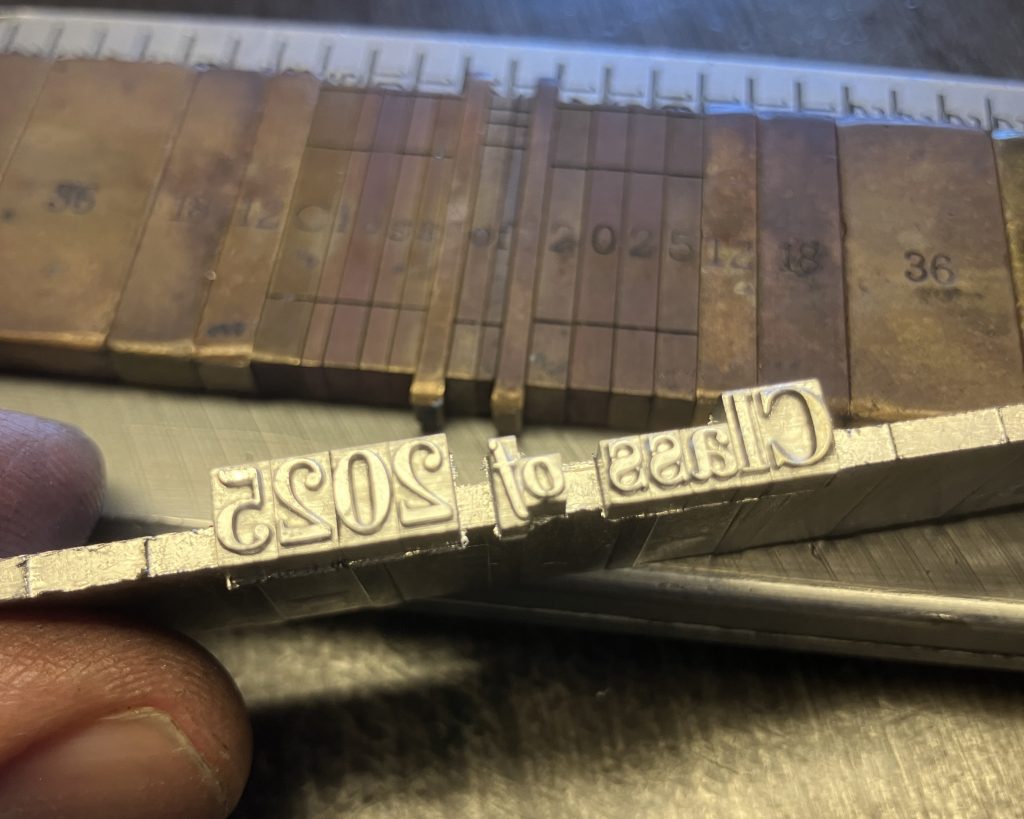
Ludlow slugs are easy to handle, easy to lock up, easy to print, easy to clean, and can be saved for future use without depleting your precious metal type.
Specifications:
Our Ludlow slugs are 25-picas long (they can be cut to shorter lengths, or combined for longer lengths). They’re .918″ high and available with a 6- or 12pt base. At the moment, we have 24 fonts available, you can see our current lineup below.
Pricing:
Basic pricing for 25-pica slugs:
18pt and larger type: $5
10-14 pt type: $6
8pt type: $7
Duplicate slugs (any size type) are $3
Additional charges may apply for justification, mixed type (see FAQs below), trimming slugs, etc.
Discounts may apply for larger orders or regular customers.
A printed proof is $10, free on orders over $50.
Please send us your text and your specifications and we’ll give you an exact quote. We bet you’ll find it competitive with other options.
Processing:
Orders will be processed once complete instructions and payment are received. Orders will ship within five days of order (in most cases, sooner). Next-day turnaround is available for $50 (but is not always possible).
Shipping:
USPS Priority Flat-Rate Boxes
($11 flat rate for most orders)
Free local pickup
(available on evenings and weekends by prior arrangement.)
Customer may provide a PDF label
(Bill to your own UPS, FedEx, or USPS account.)
FAQs:
What fonts are available?
We have the following faces/sizes available, and are always on the lookout for more. (See them all in a pdf here) (Remember: when dealing with metal type, a ‘font’ is a specfiic size, weight, and style, we can’t “make it a little bigger” or set a word in italics we don’t have).
10 “No. 11” Bold Italic (Ludlow’s Goudy)
36 Headline Gothic
12, 18, 24 Eden Light
12 Karnak Medium
12 Karnak Black
24 Radiant Bold
10 Caslon Bold
14 Bodoni
14,18 Bodoni Italic
18 Bodoni Bold
18 Ultra Bodoni
24, 48 Medium Condensed Gothic
8, 10, 12, 18 Tempo Medium (Ludlow’s Futura)
10, 12, 24 Tempo Heavy
18, 36 Tempo Bold
So what’s this machine y’all got here?

Our Ludlow Typograph is a gas-powered 1928 “Model L,” made right here in Chicago at Clybourn and Magnolia (The building’s still there). It was originally heated with natural gas, but we’ve converted it to use liquid propane. (Electric models were also produced). We acquired it in 2024 from a commercial printer in Franklin Park, Illinois. His father bought it — factory-reconditioned and upgraded— direct from Ludlow in the Sixties.
The best way to describe it is “a Mold-O-Rama for type.” The brass matrices are set in a stick, similar to typical hand-composing. The stick is locked into the machine and the mold is pumped full of molten type metal. The finished slug is ejected from the front of the machine a few seconds later, to the never-ending delight of the operator and any onlookers.
What characters do you have?
Ludlow mats generally feature the same character sets found in foundry type (A-Z, $, &, a-z, figures, punctuation, sometimes ligatures,) unless noted.
Here’s a catalog showing what faces, alternate characters, and ornaments were available for the Ludlow. Of course we do not have the full catalog, see above for our list.
Many symbols (notably “¢” “#” and “@), accented characters, and fractions were only available as individual matrices, so they’re hard to come by, but we have managed to acquire a variety of such characters, plus some ornaments, dingbats, and superscript numbers in various faces and sizes.
While Ludlow sales literature promises “unlimited type,” a set of matrices occasionally comes up short for less-common letters. If you request “razzmatazz for the fuzzy buzzards in the mezzanine,” we’ll figure it out, but it might take some creative use of the type saw.
How can I tell how much text will fit on a line?
It’s difficult to say exactly, but you can get a very solid estimate with some arcane typesetting math!
Looking at our list of mats, we see that in the case of 12pt Tempo Heavy, a full lowercase alphabet is 171 points wide. 171/26=6.58 points per letter. If we’re using the full width of the slug (25 picas, which is 300 points), one line would be 300/6.58, about 45 lowercase characters.
You can use this information to get an even more accurate (but not perfect) count. Using our example above, type 45 lowercase characters on your computer. Use a similar font, or at least a proportional (not monospaced) font, but remember, we’re not matching the actual look or size of the text, no computer font will match exactly, we’re just checking the line count.
abcdefghijklmnopqrstuvwxyzabcdefghijklmnopqrs
Then you can type out your text below it and see↵
roughly where the line breaks will fall, and how↵
many lines it’ll take to fit your copy. In this case,↵
it’s four lines.↵
Again, ignore the actual width/size of it, that won’t be accurate at all, but you should get a clear idea of how many words fit in a line and how many lines you’ll need. (For reference, it’s good typesetting practice to keep columns of text between 40-70 characters.)
Can I mix typefaces and sizes on a single line?
All matrices between 8 and 48pt (thus, all the mats we have) can be cast together on one slug. By default, all type will be centered on the slug vertically, (see image), but if two fonts are a reasonably similar point size and style, they can be aligned to the same baseline using an “offset stick.” In other cases, large type can be aligned with small type by overlapping two different slugs. Let us know what effect you’re looking for, and we can probably make it work.
Can I “hang” punctuation?
You sure can, you next-level aesthete, and it won’t even cost extra, just let us know. But remember, the slug is limited to 25 picas including the hanging punctuation.
What’s the difference between the 6pt and 12pt molds?
Half a pica, duh! But seriously, the thickness of the base of the slug is determined by the mold used. We generally cast body type on a 6pt mold and bigger type on a 12-point mold. If the type is smaller than the mold, it will add space between lines, if it’s bigger than the mold, the type will overhang the base. Neither is a problem, per se, it’s just a matter of how much spacing you want between lines, which is, of course, further adjustable by adding additional leading between slugs.
When I print, the edges of the slug are visible around some letters… How can I fix this?
Ludlow slugs have a shallower “depth of drive” (less “beard”) than foundry type. Remember that printing with a deep impression is a modern trend, it used to be considered sloppy printing! A hint of impression is no problem with Ludlow type, but with a very deep impression, the “shoulder” of the slug may contact the paper and make a blind impression. Backing-off the impression, adjusting grippers/bearers, and/or using a hard tympan packing should eliminate the problem. If you’re looking for a very deep impression and are concerned about this, we can give you a test slug to try out with your stock and your equipment.
Can I use Ludlow slugs for hot foil stamping?
Brass dies are more durable and conduct heat better, but Ludlow slugs are generally fine for short-ish runs of hot foil stamping at temperatures under 275°F. They’re commonly used to quickly change out names or other bits of text on a foil stamping job. Again, we’re happy to supply a slug to test with your equipment.
I need lots of type set, is the Ludlow efficient for that?
Not really. The Ludlow was designed mostly for headlines and smaller blocks of text for advertising. If you need pages of text for a newspaper or book, it’d be more efficient than hand-composing, but not nearly as fast as a Linotype. Sadly we do not have a Linotype, but there are a few folks around who still do that. Alternately, it could be set on a computer for polymer plates.
What’s the metal composition of a Ludlow slug? Is it safe to handle?
The Ludlow Typograph uses a “softer” alloy than foundry type. The optimal mixture is 3% tin, 11% antimony, and 86% lead. it liquifies around 480°F and is cast at 560°F. It should hold up for tens of thousands of impressions. (If you want a slug that will last a lifetime, order a magnesium or copper plate.)
Like all type metal, a Ludlow slug is safe to handle, but don’t put it in your mouth, and wash your hands after handling it . Take care not to inhale or ingest shavings or dust. Slugs should be discarded if oxidation (a white or yellow crust) appears.
Do you buy used type metal?
Ludlow slugs and other spacing with the same composition can be remelted in the crucible and re-cast, but not infinitely, the metal loses a trace of tin and antimony content each time it is remelted. At this time, we have an awful lot of spare metal, but if you’re looking to clear out your hellbox, we’d be happy to take clean and sorted type metal off your hands, perhaps in exchange for credit on your typecasting order.
- Clean: a hint of ink residue is ok, but metal with caked on-ink, oxidation, or years of dust and dirt will be rejected.
- Carefully sorted: We can only accept “soft” Ludlow/Linotype/Intertype slugs or leading/slug metal. Cardboard, copper, brass, steel rule, Monotype, or foundry type/spacing will ruin the machine!
My mouth is watering, reading all this arcane rambling about casting type. I’d really love to learn how to do this…
You should! It’s a neat process, but it requires training to mitigate the inherent risks of working with a 100-year-old machine and an open crucible of 560° liquid metal! Take our Ludlow operation class; after you’re ‘certified,’ you’re welcome to set your own type (by appointment) at a discount, (or for free, if you want to deep-clean the machine afterwards.)
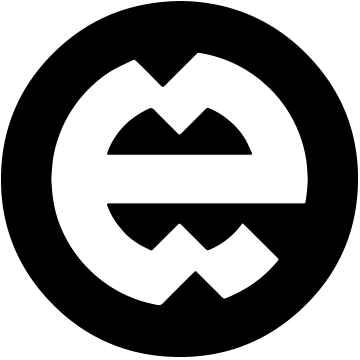
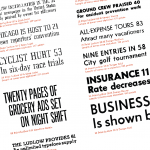
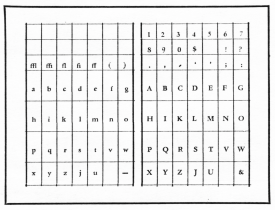
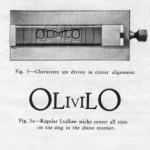
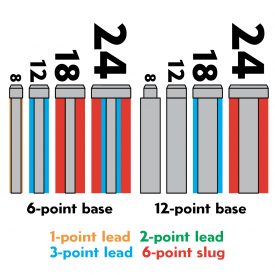
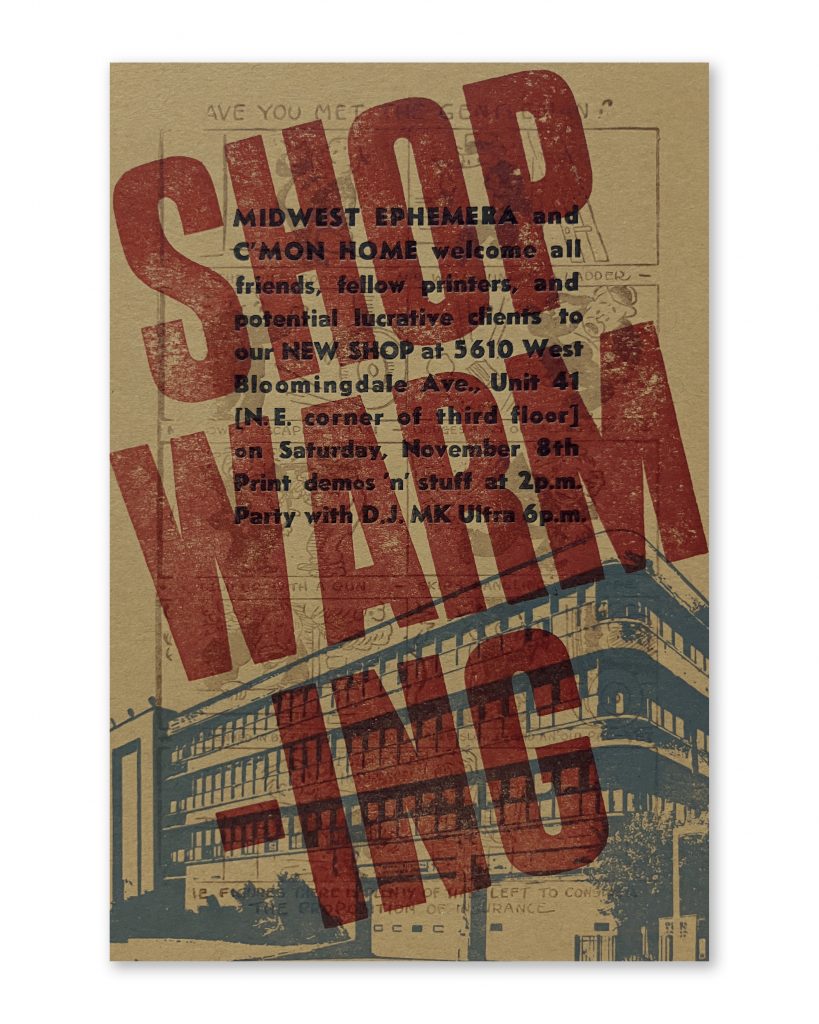
You must be logged in to post a comment.